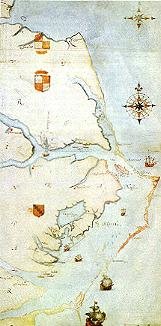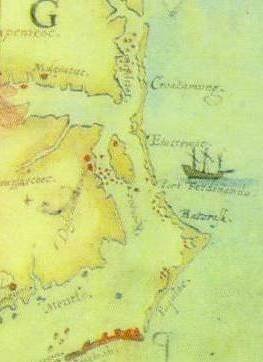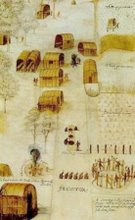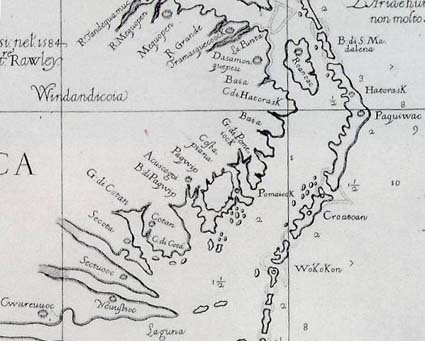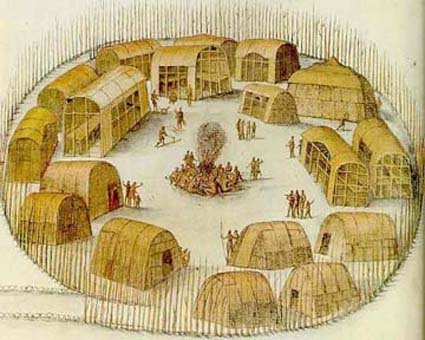At some point the colony moved from Roanoke, taking down their houses, but leaving the palisade intact. They buried some chests of goods which they could not take with them in a ditch belonging to the fortifications constructed by Lane and Amadas, and they left behind some heavy cannon and shot. This suggests that they intended to go some distance, and could not easily return for what they could not bring on the pinnace and boats. They did take falcons and other small cannon. They left carved on one tree the letters C R O, and on another, at the entrance to the palisade, C R O A T O A N, as a guide to their immediate destination, without any cross appended, a sign agreed with White to signify a move made under duress or in distress. Whether they stayed on Croatoan with Manteo and his friends cannot be ascertained. They pass out of history, if not from the field of historical speculation. It is possible that some of them were absorbed into an Indian tribe, but this cannot be proved. Perhaps, finally despairing of relief, they left American shores in the pinnace and were lost in the Atlantic.
Raleigh and the British Empire. Contributors: David B. Quinn - author. Publisher: Hodder & Stoughton. Place of Publication: London. Publication Year: 1947. Page Number: 116.
Book Title: History of North Carolina. Volume: 1. Contributors: Francis L. Hawks - author. Publisher: E.J. Hale & Son.. Place of Publication: Fayetteville, NC. Publication Year: 1857.
p 248-9
Much time was lost on the voyage, and the sandy islands of the Carolina coast were not seen until the beginning of the succeeding August. White found the island of Roanoke a desert. As he approached he sounded a signal trumpet, but no answer was heard to disturb the melancholy stillness that brooded over the deserted spot. What had become of the wretched colonists? No man may with certainty say: for all that White found to indicate their fate was a high post bearing on it the letters CRO, and at the former site of their village lie found a tree which had been deprived of its bark and bore in well cut characters the word CROATAN. * There was some comfort in finding no cross carved above the word, but this was all the comfort the unhappy father and grandfather could find. He of course hastened back to the fleet, determined instantly to go to Croatan, but a combination of unpropitious events defeated his anxious wishes; storms and a deficiency of food forced the vessels to run for the West Indies for the purpose of refitting, wintering and returning; but even in this plan White was disappointed and found himself reluctantly compelled to run for the western islands and thence for England. Thus ended the effort to find the lost colony; they were never heard of. That they went to Croatan, where the natives were friendly, is almost certain; that they became gradually incorporated with them is probable from the testimony of a historian who lived in North Carolina and wrote in 1714:--"The Hatteras Indians who lived on Roanoke Island or much frequented it, tell us," (says he) "that several of their ancestors were white people and could talk in a book, as we do; the truth of which is confirmed by gray eyes being found frequently amongst those Indians, and no others. They value themselves extremely for their affinity to the English, and are ready to do them all friendly offices. It is probable that this settlement miscarried for want of timely supplies from England; or through the treachery of the natives, for we may reason-ably suppose that the English were forced to cohabit with them, for relief and conversation; and that in process of time, they conformed themselves to the manners of their Indian relations, and thus we see how apt human nature is to degenerate." * This slight vestige of the ultimate fate of White's colony concludes the history of Sir Walter Raleigh's noble but unavailing efforts; and when we resume our story, we shall have to pass over an interval of some years, leaving meanwhile the wilderness on which we have looked to the roughness of its natural state, and the occupancy of its savage inhabitants. When the scene next opens upon us, it will be indeed upon the same theatre, but the actors will be very different, and will have entered by a different way.
Saturday, July 7, 2007
Posted by
Historical Melungeons
at
7/07/2007 04:57:00 PM
![]()


